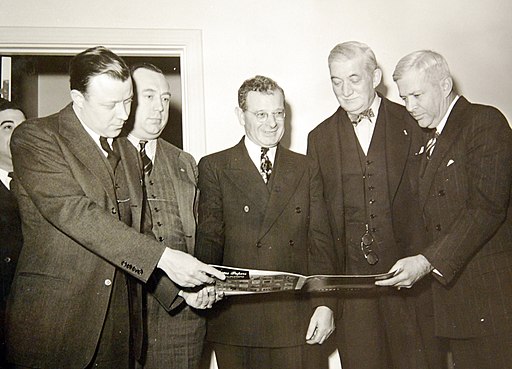
The Empire Center’s James Hanley tells readers of The Wall Street Journal that “anyone who wants to pay more to go green should have that choice” (“Congratulations, You’ve Won a Higher Electric Bill!,” January 31). The subject of Hanley’s op-ed, the residents of Yonkers in upstate New York, did have the freedom to choose between two energy plans, with a higher electric bill for the renewable-sourced one. Hanley objects to them being defaulted to the renewable option, the sort of policy which has given Richard Thaler and Cass Sunstein’s “libertarian paternalism” the reputation for being more paternalist than libertarian in practice.
It’s true that “in a properly functioning market, consumers express their preferences through the prices they pay.” Yet Hanley tacitly implies that renewable options are a luxury. This has been asserted outright by John Stossel: “The market didn’t arbitrarily pick oil as the dominant source of energy.”
R. Buckminster Fuller observed that the ability of fossil fuels to burn quickly after being formed over far vaster stretches of time makes them an “energy savings account.” The short-term benefit doesn’t reflect their limited supply, with the “fabulous energy-income wealth” of renewable alternatives untapped.
Paul Krugman noted a decade ago that despite Solyndra becoming a symbol of solar as government boondoggle, that particular company’s “failure was actually caused by technological success: the price of solar panels is dropping fast, and Solyndra couldn’t keep up with the competition.” One would expect Stossel rather than Krugman to be the pundit noting the limits of political policymakers’ ability to foresee market winners. Yet when Stossel writes that “government’s ‘green’ subsidies suck money away from far more useful activities,” he overlooks how the non-green energy sources which he assumes to be simply more economical are subsidized on a much larger scale.
Helen Leavitt’s 1970 muckraking tome Superhighway–Superhoax documented how “a staggering number of private interests” formed the impetus for “the largest single public works project ever undertaken.” Amory Lovins points out that “100-plus percent subsidies” aren’t enough to draw private investment to nuclear power, so that “we can have as many nuclear plants as Congress can force the taxpayers to pay for.”
Whether your way is the greenway or the parkway, you’re not going to get very far without a clear view of the price.
New Yorker Joel Schlosberg is a senior news analyst at The William Lloyd Garrison Center for Libertarian Advocacy Journalism.
PUBLICATION/CITATION HISTORY
- “You Can’t Have the State Highway Your Way” by Joel Schlosberg, CounterPunch, February 7, 2022
- “You Can’t Have the State Highway Your Way”
by Joel Schlosberg, OpEdNews, February 7, 2022 - “You Can’t Have the State Highway Your Way” by Joel Schlosberg, Ventura County, California Citizens Journal, February 9, 2022
- “You can’t have the state highway your way” by Joel Schlosberg, Dillon, Montana Tribune, February 9, 2022
- “You Can’t Have the State Highway Your Way” by Joel Schlosberg, Queens [New York] Ledger, February 10, 2022
- “You Can’t Have the State Highway Your Way” by Joel Schlosberg, Forest Hills/Rego Park [New York] Times, February 10, 2022
- “You Can’t Have the State Highway Your Way” by Joel Schlosberg, Leader/Observer [New York City], February 10, 2022
- “You Can’t Have the State Highway Your Way” by Joel Schlosberg, The Long Island City/Astoria [New York] Journal, February 10, 2022
- “You Can’t Have the State Highway Your Way” by Joel Schlosberg, Queens [New York] Examiner, February 10, 2022
- “You Can’t Have the State Highway Your Way” by Joel Schlosberg, Greenpoint [New York] Star, February 10, 2022
- “You Can’t Have the State Highway Your Way” by Joel Schlosberg, Brooklyn [New York] Downtown Star, February 10, 2022
- “You Can’t Have the State Highway Your Way” by Joel Schlosberg, Independent Political Report, February 10, 2022
- “You can’t have the state highway your way” by Joel Schlosberg, The Millbury, Ohio Press, February 11, 2022
- “You can’t have the state highway your way” by Joel Schlosberg, The Lebanon, Indiana Reporter, February 24, 2022


